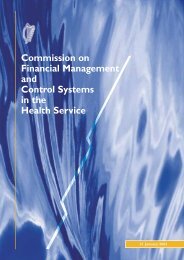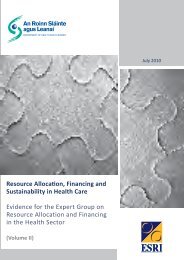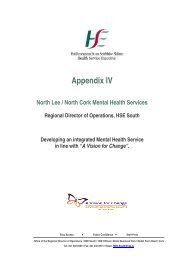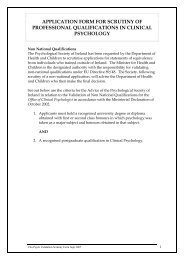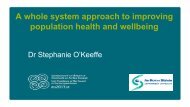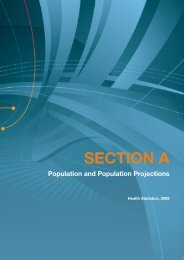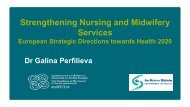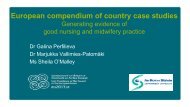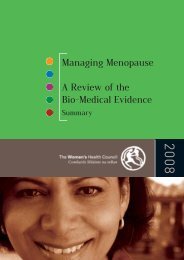All Ireland Traveller Health Study Our Geels - Department of Health ...
All Ireland Traveller Health Study Our Geels - Department of Health ...
All Ireland Traveller Health Study Our Geels - Department of Health ...
Create successful ePaper yourself
Turn your PDF publications into a flip-book with our unique Google optimized e-Paper software.
<strong>All</strong> <strong>Ireland</strong> <strong>Traveller</strong> <strong>Health</strong> <strong>Study</strong><br />
Successful primary health care projects have emphasised a process that valued empowerment,<br />
partnership and advocacy when designing and implementing health care interventions. This allows<br />
the partners to highlight inequity and negotiate solutions with their relevant partners. Community<br />
participation and intersectoral collaboration are key requisites for the success <strong>of</strong> Primary <strong>Health</strong> Care.<br />
The following shows the application <strong>of</strong> these principles in the context <strong>of</strong> the PHCTP.<br />
The initial Primary <strong>Health</strong> Care for <strong>Traveller</strong>s Project (PHCTP) was established as a joint partnership<br />
initiative with the Eastern <strong>Health</strong> Board (EHB) and Pavee Point. The project began as a pilot initiative in<br />
October 1994 in the Finglas/Dunsink areas <strong>of</strong> Community Care Area 6, with funding from the Eastern<br />
<strong>Health</strong> Board and had the following objectives:<br />
• To establish a model <strong>of</strong> <strong>Traveller</strong> participation in the promotion <strong>of</strong> health.<br />
• To develop the skills <strong>of</strong> <strong>Traveller</strong> women in providing community-based health services.<br />
• To Liaise and assist in creating dialogue between <strong>Traveller</strong>s and health service providers.<br />
• To highlight gaps in health service delivery to <strong>Traveller</strong>s and work towards reducing inequalities that<br />
exists in established services (Pavee Point, 2006).<br />
Community Participation<br />
The approach inherent in the project was to work with the <strong>Traveller</strong> community in order to develop a<br />
Primary <strong>Health</strong> Care Project that is based on the <strong>Traveller</strong> communities’ own values and perceptions,<br />
and that will have long-term positive outcomes. In the context <strong>of</strong> the PHCTP, community participation<br />
is a process through which <strong>Traveller</strong>s gain greater control over the social, political, economic and<br />
environmental factors that determine their health. Therefore the <strong>Traveller</strong> community participates in<br />
every stage <strong>of</strong> the project: including the initial assessment <strong>of</strong> the situation, defining the main health<br />
problems and issues, setting priorities for the project, implementing the activities, and monitoring and<br />
evaluating the results.<br />
Intersectoral Collaboration<br />
For Primary <strong>Health</strong> Care to be effective there must be close collaboration between the <strong>Traveller</strong><br />
community, health workers, the health sector, the local authorities and a range <strong>of</strong> other statutory and<br />
voluntary agencies. The PHCTP is a partnership project between Pavee Point and the Eastern <strong>Health</strong><br />
Board. It brought together different strengths and resources, with <strong>Traveller</strong>s, <strong>Traveller</strong> culture and a<br />
community development approach on one side, and resources, health skills, health services and health<br />
knowledge on the other. This combination is essential for the effective implementation <strong>of</strong> a Primary<br />
<strong>Health</strong> Care approach to the provision <strong>of</strong> health services.<br />
24



